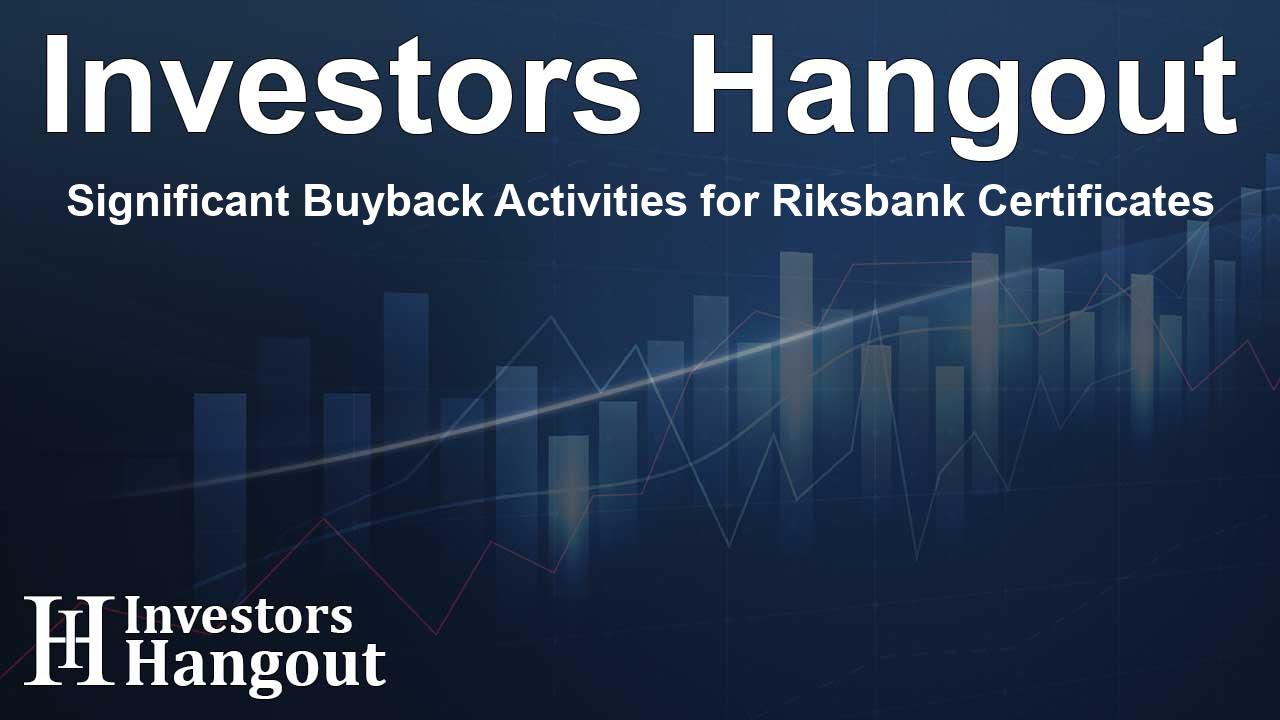Significant Buyback Activities for Riksbank Certificates

A Overview of Recent Buyback of Riksbank Certificates
In the financial landscape, buyback activities can have a profound impact. A recent buyback involving Riksbank certificates has garnered attention, particularly due to its scale and implications for the market. Understanding the details surrounding this can provide insights for investors and financial analysts alike.
Details of the Certificate Buyback
The Riksbank certificates have been highlighted due to their attractive terms. With a fixed interest rate set at 2.10%, which includes a steering rate plus 10 basis points, this presents a competitive offer for investors looking for stable returns.
Maturity of Certificates
The maturity date for these certificates is pivotal for those interested in the duration of their investment. Interestingly, the certificates are set to mature significantly in the near future (250903), which influences their attractiveness in the current financial climate.
Volume of Certificates Bought
The recent buyback saw a substantial volume of 2.6 billion units purchased, indicating strong interest from market participants. This level of engagement can signal confidence in the underlying value of these certificates, suggesting that investors are keen to take advantage of the current terms offered by Riksbank.
Trading and Settlement Dates
Key dates are essential for understanding the operational aspects of this buyback. The trade day (250901) and the settlement day (250902) are crucial for tracking the transaction process. Investors should note these dates for their investment timeline and any subsequent actions required.
Impact on the Financial Market
The buyback of Riksbank certificates could influence overall liquidity and pricing strategies in the financial market. As notable volumes are absorbed, market reaction may lead to adjustments in rates and availability of similar financial instruments.
Future Considerations
With the buyback recently completed, stakeholders should monitor how these actions will affect upcoming trading and other financial arrangements. It's vital for investors to remain informed about potential shifts in the market that arise from these types of transactions.
Frequently Asked Questions
What are Riksbank certificates?
Riksbank certificates are financial instruments issued by the Riksbank, representing a commitment to pay a specified interest rate upon maturity.
Why is the buyback significant?
The buyback's significance lies in its size and its potential influence on market confidence and liquidity.
What does the fixed rate mean for investors?
The fixed rate of 2.10% indicates a stable return, providing investors with predictable income over the term of the certificate.
How does the buyback affect the financial market?
This could enhance liquidity but may also lead to shifts in pricing for similar instruments due to increased demand.
What should investors watch for next?
Investors should keep an eye on market reactions and the impact of these buybacks on future Riksbank operations and financial instrument availability.
About The Author
Contact Lucas Young privately here. Or send an email with ATTN: Lucas Young as the subject to contact@investorshangout.com.
About Investors Hangout
Investors Hangout is a leading online stock forum for financial discussion and learning, offering a wide range of free tools and resources. It draws in traders of all levels, who exchange market knowledge, investigate trading tactics, and keep an eye on industry developments in real time. Featuring financial articles, stock message boards, quotes, charts, company profiles, and live news updates. Through cooperative learning and a wealth of informational resources, it helps users from novices creating their first portfolios to experts honing their techniques. Join Investors Hangout today: https://investorshangout.com/
The content of this article is based on factual, publicly available information and does not represent legal, financial, or investment advice. Investors Hangout does not offer financial advice, and the author is not a licensed financial advisor. Consult a qualified advisor before making any financial or investment decisions based on this article. This article should not be considered advice to purchase, sell, or hold any securities or other investments. If any of the material provided here is inaccurate, please contact us for corrections.
